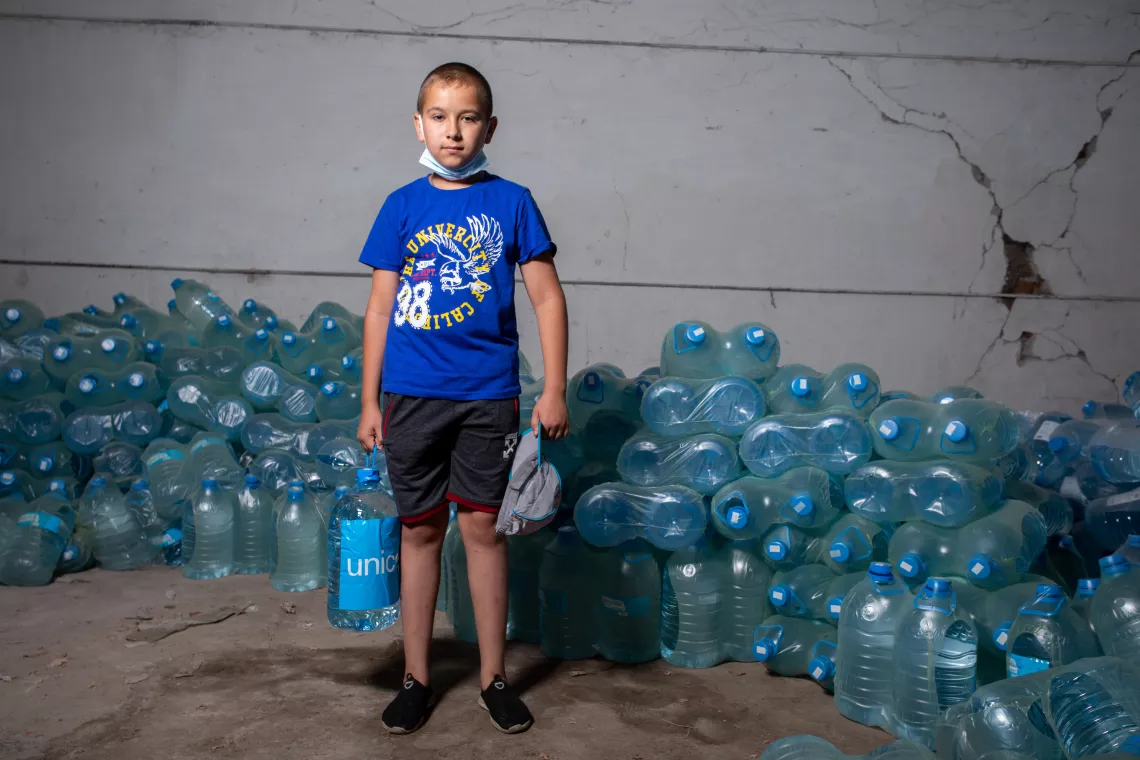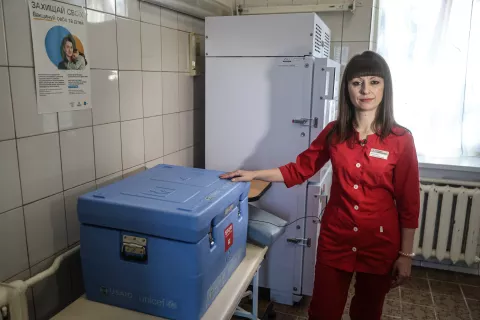Children in isolation: 3 kilometres from drinking water
UNICEF delivers safe drinking water to residents in conflict-affected Staromarievka
- Available in:
- Українська
- English
In the conflict-affected village of Staromarievka in eastern Ukraine, brothers Misha and Stanislav walk a tiring 3 kilometres through a checkpoint and across the river Kalmius to collect safe drinking water. Eight year-old Misha helps his mother Valentyna carry shopping from the shop, while 12-year-old Stanislav rolls a metal trolley stacked with bottles of water.
The water for no-man’s land

Staromarievka, also known as ‘no-man’s land’ by the local residents, lies on the ‘contact line’ which divides government-controlled and non-government-controlled areas. The small one-storey village bears the scars of seven years of protracted conflict. The red mine signs surrounding the village are a reminder of the constant danger faced by the community. The difficult way of life has forced over half of the residents to flee the village, leaving only 150 people, including seven children. They continue to survive despite having no access to a centralized water supply, a shop, a school, a hospital, a pharmacy or public transportation.
Stanislav is on holiday with his brother and uses his time to help his parents cultivate their garden and care for the cows. “We don’t have tap water, we only sometimes have poor-quality water. We only give it to cows and other animals to drink. We go across the bricks for good water,” says the boy, explaining that ‘the bricks’ is what the villagers call the bridge which connects them to the outside world. “We will drink this water, and my mother will cook something on it,” he adds.

In response to the COVID-19 pandemic UNICEF – with support from ADRA Ukraine and USAID/OFDA – are leading an initiative to provide 860 6-litre bottles of water to the residents every month. Due to travel restrictions, the water must be delivered to the neighbouring village of Hranitne and then carried back to Staromarievka on carts and bicycles.
Their mother, Valentyna, makes this journey several times each month, helped by her two sons. “This stock will last us for a few days,” she says, gesturing to the 30 litres of water behind her.
Doctor behind the checkpoints
The lockdown has added another layer of problems to the Staromarievka community. “When they start shooting in the evenings, I don’t know what to worry about: the war, the lack of jobs or coronavirus? We have too many problems here,” says Valentyna sadly.
A lack of essential supplies has forced Valentyna and her family to become more resourceful during the pandemic. In the absence of a pharmacy and a store, she sews masks for herself and her sons. Other villagers and volunteers help to produce gloves. However, the scarcity of water makes it difficult for the residents to wash their hands as often as doctors advise.

“You need to go through the wasteland to reach the well. Because of the war, wild boars thrive there, and sometimes it’s dangerous,” explains the anxious mother. The well has been renovated by UNICEF, which has made it easier for the residents to collect water. “The old well was falling apart, it was scary even to lean on it,” she recalls. This is now the village’s only well; the others have dried up and collapsed due to the hostilities.
Access to healthcare is a further source of anxiety for the Staromarievka residents. Liudmyla, another mother living in the village, worries that the community is not equipped to handle the virus. “We don’t even have a paramedic in the village. And doctors do not come here through checkpoints. When my daughter had a temperature of 40 degrees, I carried her a few kilometres in my arms to the doctor in Hranitne. It’s hard for me to find a word that describes how we live. It’s not just isolation, it’s worse, it’s like a reservation area,” she sighs.

Alina, Liudmyla’s 9-year-old daughter, used to walk 3-4 kilometres to her school in Hranitne. “But now I’m in lockdown, staying home and feeding the goats. It is good that we have more children in the village, otherwise it would be very sad,” says the schoolgirl, who came for water in a medical mask.
This year, UNICEF is aiming to ensure that at least 800,000 children and their families living in the conflict-affected eastern Ukraine have sufficient quantities of safe water for drinking, cooking and personal hygiene.

UNICEF Ukraine is working to improve access to safe drinking water and safe sanitation in an equitable manner, reducing exposure to environmental risks and improving hygiene practices in communities, schools and health facilities in conflict-affected areas. For the residents of Staromarievka, this work is integral to solving the humanitarian crisis.
Vulnerable people like Valentyna, Liudmyla and their children depend on the support of international organizations. They hope that one day they can enjoy a peaceful and sustainable way of life.




